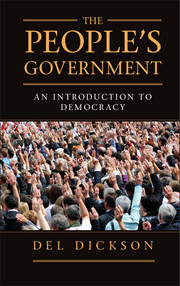Book contents
- Frontmatter
- Contents
- Acknowledgments
- Prologue
- 1 Liberty and Freedom
- 2 Freedom or Liberty?
- 3 Rights
- 4 Participation and Representation
- 5 Inclusion
- 6 Equality
- 7 Power
- 8 The Case against Democracy
- 9 The Case for Democracy
- 10 Building a Stable Democracy
- 11 Three Misconceptions about Democratization
- 12 How Democracies Die
- 13 How Democratic Is the United States?
- Glossary and Biographies
- Bibliography
- Index
- References
12 - How Democracies Die
Published online by Cambridge University Press: 05 August 2014
- Frontmatter
- Contents
- Acknowledgments
- Prologue
- 1 Liberty and Freedom
- 2 Freedom or Liberty?
- 3 Rights
- 4 Participation and Representation
- 5 Inclusion
- 6 Equality
- 7 Power
- 8 The Case against Democracy
- 9 The Case for Democracy
- 10 Building a Stable Democracy
- 11 Three Misconceptions about Democratization
- 12 How Democracies Die
- 13 How Democratic Is the United States?
- Glossary and Biographies
- Bibliography
- Index
- References
Summary
St. Augustine observed that all political systems, no matter how virtuous, eventually degenerate and disappear. As a rule, democracies die in any of three ways: external crisis, internal crisis, and/or gradual decay owing to apathy, corruption, and creeping authoritarianism.
EXTERNAL CRISIS
Democracies are as vulnerable to external attack as any other political system. Mature democracies, however, are perhaps more resilient in the face of external threats than nondemocratic states. Outsiders often mistake the naturally contentious democratic process for weakness, and underestimate democracies’ singular ability to pull themselves together and present a united front against an external threat.
Democracy’s unique virtue of offering ordinary citizens a tangible stake in society gives them compelling personal reasons to pledge their lives, fortunes, and sacred honor to protect their investment. This is rational patriotism – the public virtú that makes healthy democracies difficult to conquer and almost impossible to pacify. Rational patriotism helps mature democracies weather all manner of regional or global crises, whether man-made or natural.
- Type
- Chapter
- Information
- The People's GovernmentAn Introduction to Democracy, pp. 203 - 209Publisher: Cambridge University PressPrint publication year: 2014



